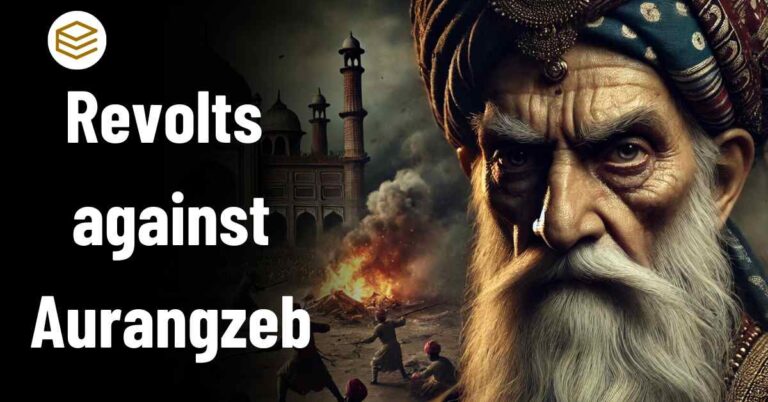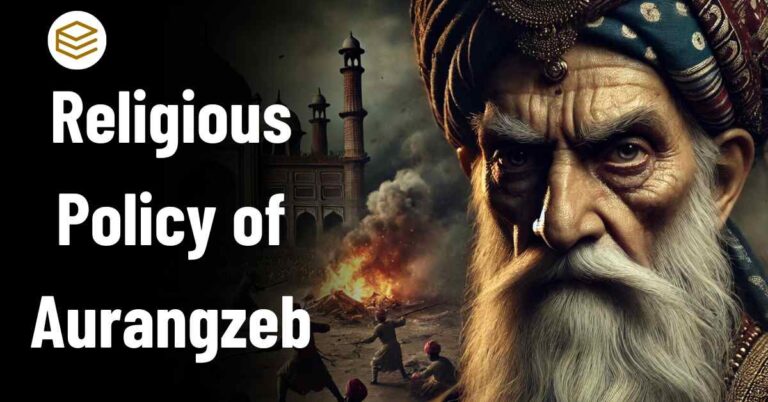January 25, 2026 5:45 am
Choosing History as an optional subject for the UPSC Civil Services Examination (CSE) 2025 can be a transformative decision for many aspirants. With its wide-ranging topics that cover ancient civilizations to modern political movements, history offers a deep understanding of India’s rich cultural, political, and socio-economic heritage
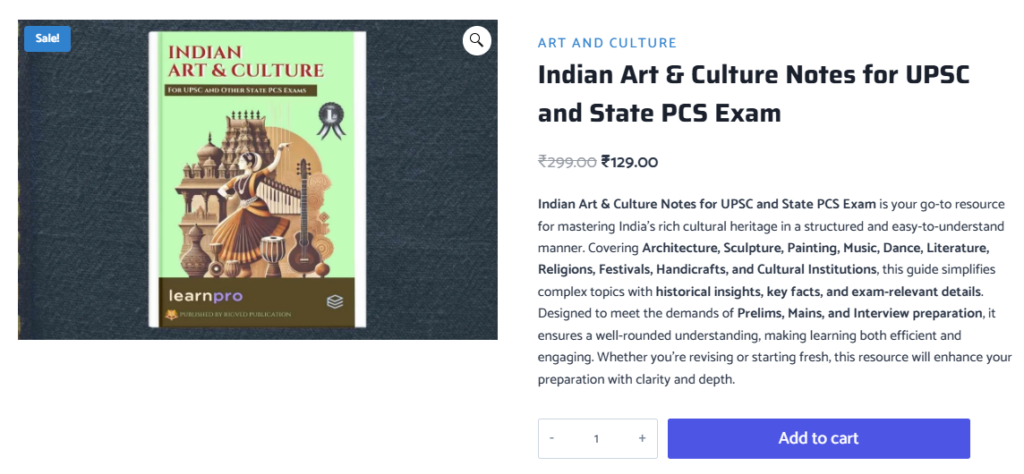
Why Choose History Optional for UPSC 2025?
History is one of the most popular optional subjects in the UPSC CSE due to its overlapping content with General Studies Papers and its relevance to understanding the broader socio-political landscape of India. Whether you have a background in humanities or a keen interest in understanding the past, history offers several advantages:
- Overlap with General Studies (GS) Papers: Topics in history often overlap with GS Paper I (Indian Heritage and Culture, History, and Geography) and parts of GS Paper II and III (Polity and Economy).
- Rich Source Material: History has a vast amount of resources available, from NCERT books to advanced scholarly works, making it easier to find reliable study material.
- Logical and Analytical Approach: History encourages the development of critical thinking and analytical skills, which are essential for answering subjective questions effectively in the mains exam.
- Scoring Potential: With a clear understanding of chronological events, causes and consequences, and effective writing skills, history can be a high-scoring optional subject.
Structure of the History Optional Syllabus for UPSC 2025
The History Optional Syllabus is divided into two papers (Paper-I and Paper-II), each carrying 250 marks, making the total for the optional subject 500 marks. Both papers cover different time periods and themes, ranging from ancient Indian history to world history.
Paper – I (History Optional Syllabus)
1. Sources
- Archaeological Sources: Exploration, Excavation, Epigraphy, Numismatics, Monuments.
- Literary Sources:
- Indigenous: Primary and Secondary; Poetry, Scientific Literature, Regional Literature, Religious Literature.
- Foreign Accounts: Greek, Chinese, and Arab Writers.
2. Pre-history and Proto-history
- Geographical Factors
- Hunting and Gathering (Paleolithic and Mesolithic)
- Beginning of Agriculture (Neolithic and Chalcolithic)
3. Indus Valley Civilization
- Origin, Date, Extent
- Characteristics, Decline, Survival, and Significance
- Art and Architecture
4. Megalithic Cultures
- Distribution of Pastoral and Farming Cultures outside the Indus
- Community Life, Settlements, Development of Agriculture
- Crafts, Pottery, Iron Industry
5. Aryans and Vedic Period
- Aryan Expansion in India
- Vedic Period: Literature, Religion, and Philosophy
- Transition from Rig Vedic to Later Vedic Period
- Political, Social, Economic Life
- Evolution of Monarchy and Varna System
6. Period of Mahajanapadas
- Formation of States: Republics and Monarchies
- Rise of Urban Centers, Trade Routes, Economic Growth
- Introduction of Coinage
- Spread of Jainism and Buddhism
- Rise of Magadha and the Nandas, Iranian and Macedonian Invasions
7. Mauryan Empire
- Foundation: Chandragupta, Kautilya, Arthashastra
- Ashoka: Concept of Dharma, Edicts
- Administration, Economy, Art, Architecture, Religion
- Disintegration of the Empire; Sungas and Kanvas
8. Post-Mauryan Period (Indo-Greeks, Sakas, Kushanas, Western Kshatrapas)
- Contact with Outside World
- Growth of Urban Centers, Economy, Coinage
- Religion: Mahayana Buddhism, Social Conditions
- Art, Architecture, Literature, Science
9. Early State and Society in Eastern India, Deccan, and South India
- Kharavela, Satavahanas, Tamil States of the Sangam Age
- Administration, Economy, Land Grants, Trade Guilds, Urban Centers
- Buddhist Centers, Sangam Literature, Art, Architecture
10. Guptas, Vakatakas, and Vardhanas
- Polity and Administration, Economic Conditions, Coinage
- Land Grants, Decline of Urban Centers, Indian Feudalism
- Caste System, Position of Women, Education
- Literature, Scientific Literature, Art, Architecture
11. Regional States during Gupta Era
- The Kadambas, Pallavas, Chalukyas of Badami
- Polity and Administration, Trade Guilds, Literature
- Vaishnava and Saiva Religions, Tamil Bhakti Movement
- Shankaracharya and Vedanta, Temple Architecture
12. Themes in Early Indian Cultural History
- Evolution of Languages and Texts
- Development of Art and Architecture
- Major Philosophical Thinkers and Schools
- Contributions to Science and Mathematics
13. Early Medieval India (750-1200)
- Political Developments in Northern India and the Peninsula
- Origin and Rise of Rajputs
- The Cholas: Administration, Village Economy, Society
- Indian Feudalism, Agrarian Economy, Urban Settlements, Trade
14. Cultural Traditions in India (750-1200)
- Philosophy: Shankaracharya, Ramanuja, Madhva
- Religion: Tamil Devotional Cult, Bhakti, Islam, Sufism
- Literature: Sanskrit, Tamil, Regional Languages, Kalhan’s Rajtarangini
- Art and Architecture: Temple Architecture, Sculpture, Painting
15. The Thirteenth Century
- Establishment of the Delhi Sultanate, Ghurian Invasions
- Economic, Social, Cultural Consequences
- Early Turkish Sultans, Iltutmish, Balban
16. The Fourteenth Century
- Khalji Revolution: Alauddin Khalji’s Conquests, Economic Measures
- Muhammad Tughluq’s Projects, Bureaucracy, Agrarian Policies
- Firuz Tugluq’s Achievements in Engineering and Public Works
17. Society, Culture, and Economy in the 13th and 14th Centuries
- Composition of Rural Society, Ruling Classes, Town Dwellers
- Status of Women, Caste, Slavery under the Sultanate
- Bhakti and Sufi Movements
- Persian Literature, Regional Languages, Sultanate Architecture
18. The Fifteenth and Early Sixteenth Century – Political Developments and Economy
- Provincial Dynasties: Bengal, Kashmir, Gujarat, Malwa, Bahmanids
- Vijayanagara Empire, Lodis, Mughal Empire First Phase: Babur, Humayun
- The Sur Empire: Sher Shah’s Administration
- Portuguese Colonial Enterprise, Bhakti, Sufi Movements
19. Society and Culture in the 15th and Early 16th Centuries
- Regional Cultures, Literary Traditions
- Provincial Architecture
- Society, Culture, Literature, Arts in Vijayanagara Empire
20. Akbar’s Empire
- Conquests and Consolidation, Jagir and Mansab Systems
- Rajput Policy, Religious and Social Outlook: Sulh-i-kul
- Patronage of Art and Technology
21. Mughal Empire in the Seventeenth Century
- Administrative Policies of Jahangir, Shahjahan, Aurangzeb
- Religious Policies, Role of Zamindars
- Crisis and Revolts, Ahom Kingdom, Shivaji and Maratha Kingdom
22. Economy and Society in the 16th and 17th Centuries
- Population, Agricultural and Craft Production
- Trade with Europe, Mercantile Classes, Banking and Credit Systems
- Condition of Peasants, Status of Women
- Evolution of the Sikh Community and Khalsa Panth
23. Culture during the Mughal Empire
- Persian Histories, Hindi and Religious Literature
- Mughal Architecture, Painting, Provincial Architecture
- Classical Music, Science, and Technology
24. The Eighteenth Century
- Decline of the Mughal Empire
- Regional Principalities: Nizam’s Deccan, Bengal, Awadh
- Maratha Ascendancy under the Peshwas
- Maratha Fiscal System, Emergence of Afghan Power (Battle of Panipat, 1761)
- Political, Cultural, Economic Conditions on Eve of British Conquest
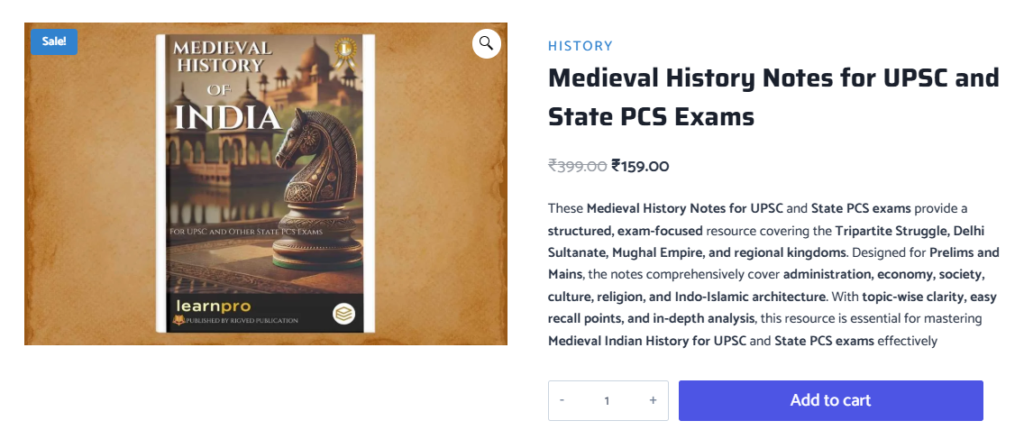
Paper – II (History Optional Syllabus)
1. European Penetration into India
- Early European Settlements
- The Portuguese and the Dutch
- English and French East India Companies
- Struggle for Supremacy
- Carnatic Wars
- Conflict in Bengal: English vs. Nawabs of Bengal
- Siraj-ud-Daulah and the English
- The Battle of Plassey and its Significance
2. British Expansion in India
- Bengal: Mir Jafar and Mir Kasim
- The Battle of Buxar
- British Expansion in Mysore
- Conflict with the Marathas: Three Anglo-Maratha Wars
- British Conquest of Punjab
3. Early Structure of the British Raj
- Early Administrative Structure
- Transition from Diarchy to Direct Control
- The Regulating Act of 1773
- Pitt’s India Act of 1784
- Charter Act of 1833
- Free Trade and Changing Colonial Rule
- Influence of English Utilitarianism in India
4. Economic Impact of British Colonial Rule
- Land Revenue Settlements
- Permanent Settlement, Ryotwari, and Mahalwari Settlements
- Economic Effects and Commercialization of Agriculture
- Rise of Landless Labor and Rural Impoverishment
- Trade and Industry
- Disruption of Traditional Commerce
- De-industrialization and Decline of Crafts
- Wealth Drain and Economic Transformation
- Infrastructure: Railroads, Telegraph, Postal Services
- Famines, Rural Poverty, and European Business Limitations
5. Social and Cultural Developments
- Indigenous Education and its Displacement
- Orientalist-Anglicist Controversy
- Introduction of Western Education in India
- Rise of Press, Literature, and Public Opinion
- Growth of Modern Vernacular Literature and Science
- Christian Missionary Activities
6. Social and Religious Reform Movements
- Reform Movements in Bengal and Beyond:
- Ram Mohan Roy, Brahmo Movement
- Devendranath Tagore, Iswarchandra Vidyasagar
- Young Bengal Movement, Dayananda Saraswati
- Social Reforms: Sati, Widow Remarriage, Child Marriage
- Contributions of Indian Renaissance
- Islamic Revivalism: Feraizi and Wahabi Movements
7. Indian Response to British Rule
- Peasant and Tribal Uprisings
- Rangpur Dhing, Kol Rebellion, Mopla Rebellion
- Santal Hul, Indigo Rebellion, Deccan Uprising
- Munda Ulgulan
- The Revolt of 1857
- Origins, Nature, Causes, and Consequences
- Post-1857 Peasant Movements
- Peasant Movements of the 1920s and 1930s
8. Rise of Indian Nationalism
- Politics of Association and Formation of Indian National Congress
- Safety-Valve Theory and Early Congress Objectives
- Moderates vs. Extremists in the Congress
- Partition of Bengal (1905) and the Swadeshi Movement
- Rise of Revolutionary Extremism in India
9. Gandhian Nationalism
- Gandhi’s Popular Appeal and Rowlatt Satyagraha
- Khilafat Movement and Non-Cooperation Movement
- Civil Disobedience Movement: Phases, Simon Commission, Nehru Report
- Round Table Conferences and Subsequent Movements
- Role of Women, Youth, and Working-Class in Nationalism
- 1937 Elections, Cripps Mission, Quit India Movement, Wavell and Cabinet Mission
10. Constitutional Developments (1858-1935)
11. Other Strands in the National Movement
- Revolutionary Movements
- Bengal, Punjab, Maharashtra, UP, Madras, and Overseas
- The Left within Congress
- Nehru, Subhas Chandra Bose, Congress Socialist Party
- Other Left Parties
- Communist Party of India and Leftist Movements
12. Politics of Separatism and Partition
- Muslim League, Hindu Mahasabha, and Communalism
- Politics of Partition and Transfer of Power
13. Consolidation as a Nation
- Nehru’s Foreign Policy and Relations with Neighbors
- Linguistic Reorganization of States (1935-1947)
- Regionalism, Regional Inequality, and Princely State Integration
- Electoral Politics and National Language Debate
14. Caste and Ethnicity Post-1947
- Backward Castes and Tribes in Electoral Politics
- Rise of Dalit Movements
15. Economic Development and Political Change
- Land Reforms, Rural Reconstruction, and Planning Politics
- Post-colonial Ecology and Environmental Policy
- Scientific Progress in India
16. Enlightenment and Modern Ideas
- Major Enlightenment Ideas
- Kant, Rousseau
- Spread of Enlightenment in Colonies
- Socialist Ideas
- Marxian Socialism and its Spread
17. Origins of Modern Politics
- European State System
- American Revolution and Constitution
- French Revolution and Aftermath (1789-1815)
- American Civil War and Abolition of Slavery
- British Democratic Politics (1815-1850): Reformers, Free Traders, Chartists
18. Industrialization
- English Industrial Revolution: Causes and Societal Impact
- Industrialization in the USA, Germany, Russia, Japan
- Industrialization and Globalization
19. Nation-State System
- Rise of Nationalism in the 19th Century
- State-building in Germany and Italy
- Disintegration of Empires with the Rise of Nationalities
20. Imperialism and Colonialism
- Regions of Imperialism
- South and Southeast Asia, Latin America, South Africa, Australia
- Neo-imperialism and Free Trade
21. Revolution and Counter-Revolution
- 19th-Century European Revolutions
- Russian Revolution (1917-1921)
- Fascist Counter-Revolution in Italy and Germany
- Chinese Revolution (1949)
22. World Wars
- World Wars as Total Wars and Societal Implications
- Causes and Consequences of WWI and WWII
23. The World After World War II
- Emergence of Two Power Blocs
- Non-Alignment and the Third World
- UNO and Global Disputes
24. Liberation from Colonial Rule
- Regions of Liberation
- Latin America (Bolivar), Arab World (Egypt), Africa (Apartheid to Democracy), Southeast Asia (Vietnam)
25. Decolonization and Underdevelopment
- Constraints to Development in Latin America and Africa
26. Unification of Europe
- Post-War Foundations; NATO and European Community
- Consolidation and Expansion of the European Community
- Formation of the European Union
27. Disintegration of Soviet Union and the Unipolar World
- Collapse of Soviet Communism (1985-1991)
- Political Changes in Eastern Europe (1989-2001)
- End of Cold War and US as Lone Superpower
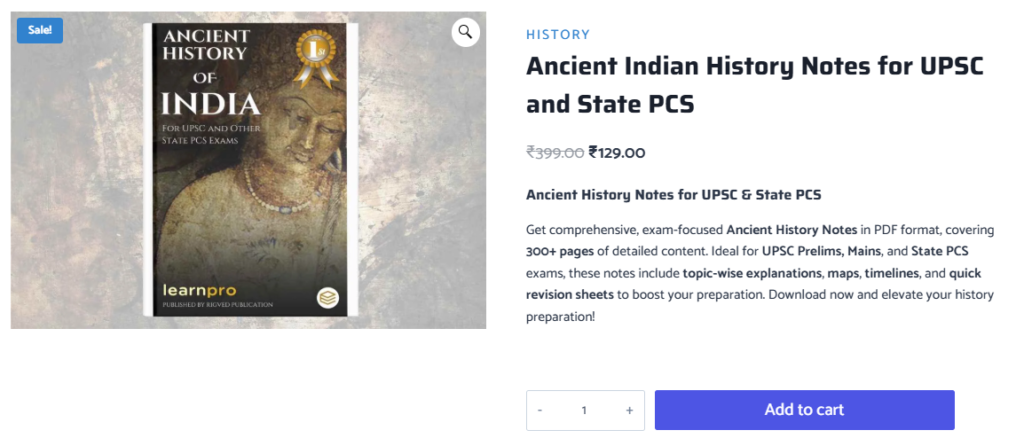
How to Approach History Optional for UPSC 2025
Understanding the structure of the syllabus is the first step. However, crafting a robust study plan and strategy is equally important. Here’s how you can approach History Optional to ensure success:
- Break Down the Syllabus into Manageable Sections:
- Divide topics based on Ancient, Medieval, Modern, and World History.
- Create a timeline to track your progress through each section.
- Focus on Conceptual Clarity and Chronology:
- Historical events are often interlinked. Understanding chronological sequences and their implications will help you write more coherent answers.
- Focus on causes, consequences, and historical perspectives to build a strong narrative.
- Integrate Current Affairs with Historical Perspectives:
- Current issues often have historical roots. For example, understanding border conflicts or constitutional amendments requires historical context.
- Answer Writing Practice:
- The key to success in UPSC mains is effective answer writing. Focus on structuring your answers with an introduction, body, and conclusion.
- Use maps, diagrams, and flowcharts wherever applicable to make your answers visually appealing and informative.
Key Topics to Focus On for History Optional UPSC 2025
While the syllabus is vast, certain topics are more frequently asked in the examination. Focusing on these areas can give you a strategic advantage.
Ancient Indian History
- Indus Valley Civilization: Features, decline, and significance.
- Vedic Period: Early and later Vedic society, polity, economy, and religion.
- Mauryan Empire: Administration, Ashoka’s Dhamma, and decline.
- Gupta Age: Golden age of Indian culture, science, and administration.
- Post-Gupta Period: Rise of regional kingdoms, art, and literature.
Medieval Indian History
- Delhi Sultanate: Administration, economic reforms, and cultural developments.
- Mughal Empire: Akbar’s administration, religious policies, and the decline of the empire.
- Bhakti and Sufi Movements: Their role in shaping Indian culture.
- Maratha Confederacy: Rise under Shivaji and the subsequent decline.
Modern Indian History
- Advent of Europeans: Impact of British colonialism on Indian polity and economy.
- Revolt of 1857: Causes, nature, and consequences.
- Indian National Movement: Phases of freedom struggle from Moderate Phase to Gandhian Era.
- Post-Independence India: Integration of princely states, constitutional developments, and socio-economic reforms.
World History
- French and American Revolutions: Causes and impact on world history.
- Industrial Revolution: Economic and social implications globally.
- World Wars: Causes, consequences, and reordering of the world map.
- Cold War Era: Ideological conflicts, non-alignment, and the emergence of new world powers.
Preparation Strategies for History Optional UPSC 2025
- Start with NCERT Books: Begin your preparation with NCERT textbooks from class VI to XII to build a strong foundation in history.
- Refer to Standard Books:
- Ancient History: R.S. Sharma’s “India’s Ancient Past”
- Medieval History: Satish Chandra’s “Medieval India”
- Modern History: Bipin Chandra’s “India’s Struggle for Independence”
- World History: Norman Lowe’s “Mastering Modern World History”
- Make Comprehensive Notes: Write concise notes for each topic, highlighting important dates, events, and perspectives.
- Use Maps Extensively: For both Indian and world history, maps help illustrate geographical aspects and provide context to historical events.
- Solve Previous Year Question Papers: Analyze patterns and frequently asked questions to prioritize important topics.
- Stay Updated: Read newspapers like The Hindu or Indian Express to integrate current events with historical insights.
Common Mistakes to Avoid in History Optional
- Ignoring Answer Writing Practice: History requires analytical and balanced answers. Regular practice helps improve both content and presentation.
- Overloading with Facts: While dates and facts are important, avoid cramming too much. Focus on analysis and interpretation.
- Neglecting Revision: Regular revision ensures retention of key facts, events, and concepts.
- Not Connecting Events: History is interconnected. Relate events across timelines and regions to provide a comprehensive answer.

Benefits of Choosing History Optional for UPSC 2025
- Holistic Understanding of Indian Society: History offers insights into the cultural, social, and political fabric of India.
- Useful for Essay and General Studies Papers: Historical perspectives are invaluable in essays and GS papers, especially in topics related to culture, governance, and polity.
- Resource Abundance: A wealth of study materials, including books, online courses, and previous years’ papers, are available to assist aspirants.
- No Need for Prior Background: Even candidates without a history background can excel with the right approach and study plan.
Ancient History Optional Notes for UPSC >
- Indian Feudalism (300-1200 CE)
- Prehistory and Proto-history : A detailed Analysis
- Archaeological Sources: Excavation, Epigraphy and Numismatics
- Chanakya’s Arthashastra: A Book on Ancient Indian Statecraft
- Mauryan Empire: Foundation and Expansion
- Megasthenes’ Indika
- Mauryan Art, Architecture, and Sculpture : 4th Century BC Marvels (PDF Download
- Iranian and Macedonian Invasions of India and Their Impact
- Chandragupta Maurya
- Buddhism – An Overview of Ancient Indian Religions
- Jainism : An Overview of Ancient Indian Religions
- Formation of States (Mahajanapadas): Republics and Monarchies
- Expansion of Aryans in India: Migration, Settlement, and Cultural Evolution
- Megalithic culture in India
- Vedic Age in India
- Neolithic Age in India
- Mesolithic Rock Paintings in India
- Paleolithic Age in India
- Harappan Civilization : Date, Extent, and Characteristics
- Chola Empire (9th -13th century AD): Administration, Local Govt., Village Economy, Society
- Early Medieval India (750-1200) – A detailed Overview
Download World History Notes PDF for UPSC
The Renaissance in Italy 14th Century: A Rebirth and Transformation
The American Revolution : Factors leading to revolution
The Seven Years War (1756–1763): A Comprehensive Analysis
The Holy Roman Empire: A Complex Political Entity
Unification of Germany: The Birth of a Nation
Otto von Bismarck (1815–1898): The Iron Chancellor and Architect of German Unification
Napoleon Bonaparte (1769–1821): Architect of Modern Europe
The Thirty Years’ War: A Pivotal Chapter in European History
The European State System: Evolution, Characteristics, and Global Influence
The History Optional Syllabus for UPSC 2025 offers an enriching journey through India’s past and global developments. With its comprehensive coverage and strategic importance in the UPSC exam, history remains a top choice for many aspirants. By following a structured approach, integrating current affairs, and practicing answer writing, you can excel in this subject and boost your chances of success in the UPSC Civil Services Examination 2025.
FAQs
1. Is History a good optional subject for UPSC 2025?
Yes, history is one of the most popular optional subjects for UPSC due to its comprehensive syllabus, overlap with General Studies, and availability of resources. It helps in understanding India’s socio-political fabric and provides a solid foundation for essay writing and GS papers.
2. What are the benefits of choosing History optional for UPSC?
- Overlap with GS Papers: Especially GS Paper I (Indian Heritage, Culture, and History).
- High Scoring Potential: With proper preparation and answer writing skills.
- No Specialized Background Required: Anyone with a genuine interest can opt for it.
- Rich Resource Base: Plenty of books, online courses, and previous year papers are available.
3. What is the structure of the History Optional Syllabus for UPSC 2025?
The syllabus is divided into two papers:
- Paper-I: Covers Ancient and Medieval Indian History.
- Paper-II: Focuses on Modern Indian History and World History.
4. How should I start preparing for History Optional?
- Begin with NCERT books for a basic understanding.
- Move to standard books like:
- R.S. Sharma for Ancient History,
- Satish Chandra for Medieval History,
- Bipin Chandra for Modern History,
- Norman Lowe for World History.
- Make concise notes, focus on chronology, and integrate current affairs with historical perspectives.
5. Which are the best books for History Optional UPSC 2025?
- Ancient History: R.S. Sharma’s “India’s Ancient Past”
- Medieval History: Satish Chandra’s “Medieval India”
- Modern History: Bipin Chandra’s “India’s Struggle for Independence”
- World History: Norman Lowe’s “Mastering Modern World History”
6. How much time does it take to prepare for History Optional?
On average, it takes around 4-5 months of dedicated study to cover the entire syllabus, provided you are consistent with your preparation. Regular revision and answer writing practice are crucial to maximize your score.
7. How to improve answer writing for History Optional?
- Focus on structuring answers with an introduction, body, and conclusion.
- Use diagrams, flowcharts, and maps where relevant.
- Practice previous year questions to understand the pattern and expectations.
- Incorporate critical analysis and multiple perspectives in your answers.
8. Does History optional overlap with General Studies papers?
Yes, history has significant overlap, especially with:
- GS Paper I: Indian Heritage and Culture, History, and Geography.
- GS Paper II and III: Certain historical perspectives are useful in polity, governance, and economic discussions.
9. Can I choose History optional if I don’t have a history background?
Absolutely! Many successful candidates from engineering, science, and commerce backgrounds have chosen history as their optional and cleared the exam. The key is consistent preparation and interest in the subject.
10. What are the common mistakes to avoid while preparing for History Optional?
- Ignoring Answer Writing Practice: History requires analytical and well-structured answers.
- Overloading with Facts: Focus on analysis over excessive factual data.
- Neglecting Revision: Regular revision is necessary for retention.
- Lack of Integration: Don’t treat topics in isolation; interlink events for a comprehensive understanding.
11. How important are maps in History Optional preparation?
Maps play a crucial role, especially in Ancient and Medieval Indian History. They help in:
- Illustrating historical events and geographical context.
- Highlighting trade routes, battle sites, and cultural diffusion.
12. How to manage History Optional preparation along with General Studies?
- Integrate Preparation: Use overlapping topics to your advantage.
- Create a study schedule that balances both GS and optional subjects.
- Allocate specific days for revision and answer writing.
13. Is History Optional considered a scoring subject in UPSC?
Yes, with proper preparation, structured answers, and critical analysis, history can be a highly scoring subject. Many toppers have scored over 300 marks in history optional.
14. What is the role of current affairs in History Optional preparation?
Current affairs help in drawing parallels between past and present. For example, understanding contemporary border disputes or constitutional amendments is easier with historical context.
15. Are coaching classes necessary for History Optional?
While many candidates prefer self-study, coaching can be beneficial for:
- Structured Guidance on complex topics.
- Answer Writing Practice and feedback.
- Peer Discussions for broader perspectives.
However, with the right resources and discipline, self-study is equally effective.
16. How can I revise effectively for History Optional?
- Make concise notes during your first reading.
- Use timelines and mind maps to connect events.
- Revise regularly and practice mock tests to assess your preparation.
17. What kind of questions are asked in History Optional?
Questions can be:
- Descriptive: Analyze historical events, causes, and consequences.
- Comparative: Compare different periods or events.
- Interpretative: Provide critical perspectives on historical interpretations.
18. Can History Optional help in the UPSC Interview stage?
Yes, history helps in developing a broader worldview and enhances your ability to answer questions on current socio-political issues during the interview.
19. How important is historiography in History Optional preparation?
Historiography—the study of historical writing and perspectives—is crucial as it helps in providing multi-dimensional answers. Understanding different historians’ viewpoints adds depth to your answers.
20. Where can I find reliable resources for History Optional preparation?
- Standard Books mentioned above.
- Online Platforms like NPTEL, Coursera, and various UPSC forums.
- Government Publications like IGNOU material and NCERT books.
- Previous Year Question Papers and mock tests from reputed coaching centers.



